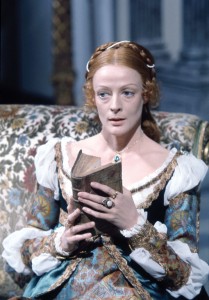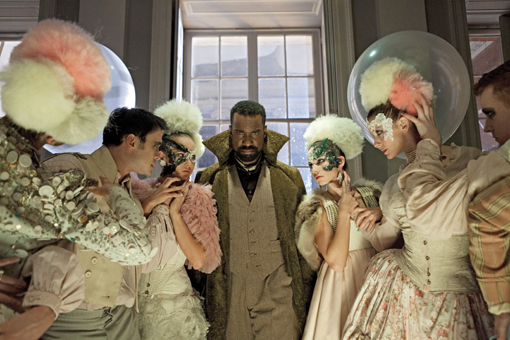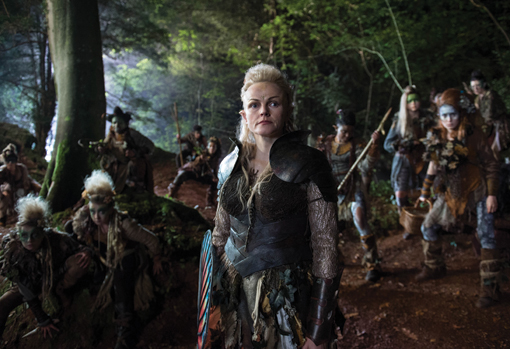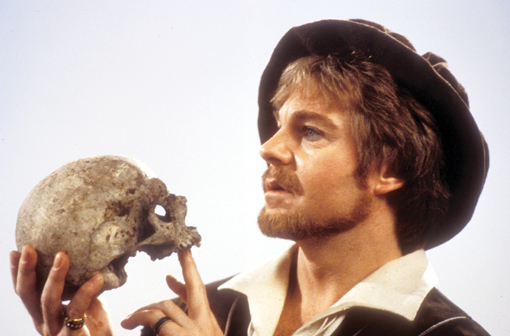 This year will see a national celebration of the Bard’s work, as Hilary Bishop, Director of the RES Project for the BBC and Editor for BBC Archive Development explains.
This year will see a national celebration of the Bard’s work, as Hilary Bishop, Director of the RES Project for the BBC and Editor for BBC Archive Development explains.
‘Who will believe my verse in time to come…’
It seems odd to make a particular fuss about the year and day of someone’s death – a little macabre perhaps - but so it is with Shakespeare, 400 years on. This year will see a national celebration of Shakespeare in theatres, cinemas, museums, galleries and certainly on TV and radio. The theme, I suspect, will be how to make Shakespeare meaningful and relevant in the twenty-first century, and how to foster a new generation of Shakespeare lovers.
At the BBC, we’re making a large collection from the BBC’s archive available to those in UK education; a Festival of new material will be broadcast, including a journey around the country with the Royal Shakespeare Company (RSC) as professionals join up with amateur theatre companies to put on A Midsummer Night’s Dream: A Play For The Nation; Shakespeare on Tour which explores the locations where Shakespeare’s works have been performed, possibly near you and ShakespeareMe, a piece of fun which allows you to sum up your daily mood using emojis and Shakespeare quotations.
The BBC Archive
The fuss for someone like me, who’s been busy working to make lots of Shakespeare material available for 2016, makes me grateful for the excuse and the opportunity. So it was in 2014 that I asked one of my colleagues to begin the extensive task of discovering everything the BBC had produced which related to Shakespeare. It’s harder than it sounds because firstly, there’s a lot of it over the entire life of the BBC from 1923, and also because some of the most interesting references are not the works themselves, but oblique references, which demonstrate the extent to which the playwright has influenced British culture. Given the volume and the impact, I started to feel that maybe the 400 year fuss might be justified after all.
...The most complete list of BBC productions includes over 1,200 programmes of the sonnets and plays
The most complete list of everything the BBC has ever done (but not necessarily has copies of) includes more than 1,000 TV and radio programmes of the plays and about 200 radio and TV programmes of the sonnets and poems. Excerpts from Shakespeare have been included in another 560 programmes and there are about 275 versions of opera and ballet. Factual TV and radio programmes about Shakespeare yielded another four hundred or so and there are hundreds of programmes which reference Shakespeare in passing. Aside from the programmes there are thousands of still images from the productions, as well as scripts, music scores, audience research, set layouts and camera position charts.
Of course the other question to answer is how much material from this vast catalogue the BBC actually has copies of. The answer is not all, but quite a lot. Since the 1960s the situation is quite promising, but there’s much less beforehand. As many of you know, in 1923 technology did not exist for easy capture of radio output and even as this facility developed it was still very expensive to do. It wasn’t possible to record TV output electronically until the late 1940s and even then it was not introduced into some production techniques until the 1950s. The collection we have called the BBC Shakespeare Archive Resource (http://shakespeare.ch.bbc.co.uk), is made up of a healthy selection of all the material I have described above.
The earliest highlights include part of the 1955 production of The Merry Wives of Windsor starring Anthony Quayle, Angela Baddeley and Joyce Redman, and the RSC’s production of As You Like It, broadcast in 1963 starring a young Vanessa Redgrave as Rosalind. For your further delight we also have the BBC’s Audience Research Report on that production of The Merry Wives of Windsor. It’s good to know that a significant part of the 1955 audience found the play to be ‘delightful, high-spirited and altogether rollicking good fun’, in contrast to the ‘minority group who have no liking for televised Shakespeare and who particularly resent its appearance in the Sunday evening programme.’

Maggie Smith in the BBC Play of the Month The Merchant of Venice, originally broadcast in April 1972. (1972 © BBC).
On radio we have all the voices you’d expect to find reading Shakespeare including Sir John Gielgud, Sir Laurence Olivier, Sir Michael Redgrave and Dame Peggy Ashcroft. In the factual category we have Paul Robeson talking in 1959 about acting Shakespeare, the difficulty of English accents and the series of Prefaces to Shakespeare and Shakespeare in Perspective which accompanied the major BBC series of Shakespeare’s works and transmitted between 1978 and 1985.
On the lighter side we have Blackadder punching Shakespeare ‘for every schoolboy and schoolgirl for the next four hundred years!’, as well as Mastermind quiz rounds and a sketch from The Morecambe and Wise Show.
Finding this material, because sometimes it’s not until you look for things that you discover they’re not where you’d hoped, and getting it into a digital format is in itself like doing a jigsaw, not to mention finding subtitles if they already exist and deciding what to spend money to subtitle where they don’t.
It has, however been great fun realising that Christopher Plummer, looking quite mature in The Sound Of Music (1965), is virtually the same age as the ‘young’ prince in Hamlet At Elsinore (1964), showing what magic you can achieve with stage makeup. There’s also triumph in bringing back in to the archive previously ‘lost’ material returned via the BFI from the US Library of Congress. Sadder though was to discover that we only have the first reel, but not the second of All’s Well That Ends Well (1968) by the RSC, which was the first BBC Shakespeare play to be transmitted in colour.
We’ve restored some of the older material too, including the Wars of the Roses trilogy of Henry VI, Edward IV, and Richard III, broadcast in 1965, which was included in the RSC/Barbican’s recent season of Shakespeare on Screen.
All this archive detective work has really been about making as much of this material as possible available in education, as part of the Research and Education Space project, of which more in a moment. So to this end we have set up the BBC Shakespeare Archive Resource at http://shakespeare.ch.bbc.co.uk/ which includes hundreds of TV and radio programmes, including all the BBC Television Shakespeare adaptations and the other gems I’ve mentioned so far. There are also over 1000 photographs of classic Shakespeare productions and performers. Everyone can see the website, but to access and play the media you need to log in. Direct access or username and password are dependent on you being in UK formal education and details of how to get access are on the website.
There’s an even more extended collection of radio and TV material to those of you who have access to the BUFVC’s Box of Broadcasts (BoB) service. Under the Educational Recording Agency (ERA) licence we can also include all the BBC material broadcast since 1989 and the already available BBC archive which starts in 2007. So that’s a huge amount of Shakespeare, including The Shakespeare Animated Tales in English and Welsh, the modern take on the plays in Shakespeare Retold, the Storyville on American prisoners staging The Tempest, In Search of Shakespeare and Bard On The Box with the likes of Damon Hill, the late Claire Rayner and Prince Charles. This larger collection is also available for those of you who subscribe to Planet e-Stream’s Connect service.
Research and Education Space
Now, back to the Research and Education Space (RES) http://res.space - an initiative to improve access to public collections and archives for use in education and research. Imagine someone told you that you were allowed to use all the programmes broadcast on TV and radio since 1989 in your education and research - from your teacher showing you a clip, to watching a whole programme in your lesson, to you using a clip to demonstrate an argument you were making in an essay. Then imagine someone told you that there was a really simple system in your school, college or university which allowed you to do all that and, as well as all that TV and radio, there were also vast numbers of other supporting documents, photos, and video and audio assets available to you from places like the British Library and the British Museum, as well as local galleries and museums. That’s what RES is working to enable.
...RES is an initiative to improve access to public collections and archives for use in education and research
RES is a partnership between Jisc, the BUFVC and the BBC which works with teachers, students and academics, to find out what they use and want to use in teaching and research. RES also works with curators of world class digital collections to make their catalogues and the assets they describe available to the RES project.
The BBC has built an open platform that indexes and organises the digital collections of libraries, museums, broadcasters and galleries to make their content more discoverable, accessible and usable. Images, TV and radio programmes and documents from organisations such as The British Museum, the British Library, the National Archives, Europeana and the Wellcome Trust are all being indexed by the RES platform. This then allows RES to work with the people who make educational products, to encourage them to make use of the collections that are included in RES and incorporate this into existing and new products.
The BBC is therefore both a partner in the RES initiative and a contributor of material to it. The BBC’s Shakespeare collection is the first thematic collection the BBC has made available to the RES project. What that means is that we have released an open catalogue in the form of linked open data about Shakespeare. The power of our collection is greatly enhanced by being linked to other collections, and products powered by the RES platform that can provide a much richer set of related learning materials for teachers and researchers to use.

Otis Erhvero the titular character in a 2012 Shakespeare Unlocked production of Othello. (2012 © BBC).
BBC Shakespeare Festival
...We've restored lots of older material, including The Wars of the Roses trilogy and Richard III, broadcast in 1965
Beyond the archive and archival collections, there’s lots of new material coming your way in 2016. The BBC Shakespeare Festival 2016 will launch on 23 April (Shakespeare’s assumed birth and death day) and continue for a month across all BBC services. Russell T. Davies adapts the original verse of A Midsummer Night's Dream with a cast that includes Maxine Peake, Matt Lucas and Bernard Cribbins. BBC Two is reviving one of the highlights of 2012 with three more episodes of The Hollow Crown, starring Benedict Cumberbatch, Judi Dench and many others. Upstart Crow is a Ben Elton comedy, starring David Mitchell as Shakespeare, Liza Tarbuck as his wife Anne and Harry Enfield as his dad. Promisingly, Elton says: ‘I have tried very hard to think myself into Shakespeare’s creative world, writing only with a small chicken feather and not changing my underpants for a year.’
Shakespeare on Tour builds a digital picture of the explosion in the performance of Shakespeare’s plays, from the first performances to the present day. It brings together academic research (from Records of Early English Drama and the Arts and Humanities Research Council) about performances of Shakespeare's plays during his lifetime. Information is taken from period manuscripts in archives across the country, together with stories of later provincial Shakespeare productions told through original playbills from the late 18th century onwards that are held in the British Library’s collections.

Maxine Peake as Titania in Russell T. Davies’ upcoming BBC production of A Midsummer Night’s Dream. (2015 © BBC / Des Willie).
Horrible Histories is back with a special episode delving in to the life and times of the world's most famous writer. How did Shakespeare climb to become a royal favourite? And what was it like to be in the audience of one of his plays, where fruit was thrown at the stage, it was illegal for women to act, and there were no toilets. And of course there’s a song, featuring every one of his plays.
There are two interactive Live Lessons in partnership with the RSC, for primary school and secondary school pupils, which will broadcast from the Library of Birmingham to schools across the country. Both will be filmed in front of a live audience of school children from the West Midlands.
And then to cap it all you can Shakespeare yourself, by selecting an emoji which fits your mood and in return you will receive the perfect Shakespeare quote which best expresses that feeling.
Hopefully there’s material here which today’s audience, both general and academic, will experience as ‘delightful, high-spirited and rollicking good fun’.
The Bard today
In recent audience research carried out by the BBC, we found that almost everyone knows who Shakespeare is, and the vast majority have had some contact with his works, particularly reading plays, watching a film or TV adaptation or through school. Shakespeare is generally felt to be quite hard to understand and most people aren’t that confident to talk about him with others.
Many people are somewhat ambivalent about whether or not they like his plays and poems (perhaps they don’t feel they know enough to say), but amongst those with a view one way or the other the balance is generally positive. Women and ‘the middle class’ claim the greatest understanding and liking of him and his works – but so do younger people.
What’s more, a higher number of people think he is relevant to modern times and ‘for everybody’, than think he has no relevance or is just for an elite, but many are unsure. Younger people associate Shakespeare most strongly with Romeo and Juliet and have mixed memories of Shakespeare at school. Older people have more varied associations and ‘boring’ is the predominant feeling towards school experiences. Shakespeare is felt to be original, intellectual and emotional, but also a bit serious and hard to understand. Few say he is boring or dull, but neither is he ‘fun’. Many want to know more about Shakespeare, and over half are interested in the 400th anniversary (a view broadly shared across the demographic range).
We have started 2016 in the English-speaking world saddened by the proximity of the deaths of David Bowie, Alan Rickman and Lemmy. So it seems worth remembering that 400 years ago, one day apart, the world lost not only Shakespeare, but another great contributor to world literature, Miguel de Cervantes. News might not have travelled so fast in 1616 and the instant outpouring of grief might not have been overwhelming, but with the benefit of hindsight, the lasting impact of that double loss in 1616 cannot be underestimated.

Derek Jacobi as Hamlet in Hamlet, Prince of Denmark, 1980. (1980 © BBC).